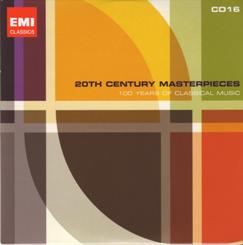20th Century Masterpieces - 100 Years of Classical (2008) CD01
20th Century Masterpieces - 100 Years of Classical (2008) CD01

1901 - Rachmaninov: Piano Concerto No.2 in C minor, Op.18
[1] I Moderato
[2] II Adagio sostenuto
[3] III Allegro scherzando
Leif Ove Andsnes
Berliner Philharmoniker, Antonio Pappano
Recorded live: 3-4 June 2005, Philharmonie, Berlin
1905 - Debussy: La mer
[4] I De l'aube a midi sur la mer
[5] II Jeux de vagues
[6] III Dialogue du vent et de la mer
Philharmonia Orchestra, Carlo Maria Giulini
Recorded: 11-13 & 19 April 1962, Kingsway Hall, London
[7] 1907 - Delius: Brigg Fair (An English Rhapsody) 15.51
Royal Philharmonic Orchestra, Sir Thomas Beecham
Recorded: 31 October 1956 & 2 April 1957, No.1 Studio, Abbey Road, London
One of the criteria for a Hall of Fame entry is availability, so this vast 16-CD set may not apply for long. It is unlikely to continue to be in print for years to come, so snatch it up while you can. Several of the performances above have been reissued many times and some, such as du Pré’s Elgar, Boult’s Planets, and Isserlis’s Protecting Veil, are regarded as classic recordings.
The set covers 96 years of “masterpieces,” from Rachmaninoff’s Second Piano Concerto of 1901 to Thomas Adès’ Asyla of 1997, and presents them in chronological order (as listed above). It is a handy and reasonably comprehensive overview of 20th-century music: useful as a reference, although notes are too scanty for serious study, and great fun to dip into. A plus is that the works are presented in their entirety, not excerpted—with the exception of the “Abschied” movement from Mahler’s Das Lied von der Erde (another “classic” performance from Christa Ludwig and Otto Klemperer).
The chronological layout brings up odd bedfellows: Penderecki’s Threnody for the Victims of Hiroshima shares a disc with Bernstein’s “Symphonic Dances” from West Side Story. And it comes as a surprise to realize that Vaughan Williams’s lark was ascending at around the same time Stravinsky stunned the Paris elite with his primitive rite.
With such a large collection, inevitably faults can be found. Are all these works truly “20th-century masterpieces”? Landowski’s Adagio cantabile, Khachaturian’s Masquerade, and Maw’s Dance Scenes probably don’t qualify, and while it is well known, Fanfare for the Common Man is hardly Copland’s masterwork. Surely Appalachian Spring would have been the obvious choice. Other notable omissions include Bartók’s Concerto for Orchestra, Messiaen’s Turangalila-symphonie, and the American repertoire generally. Henze, Schnittke, and Birtwistle are composers who might have been more strongly represented than they are, but the later music in this set is of course limited by what EMI could find in their archive.
Performances are generally of a high standard, and some are outstanding. Examples include Beecham’s Delius (Brigg Fair) and Rostropovich in Dutilleux’s cello concerto, “Tout un monde lointain . . .”. Simon Rattle and his old Birmingham band get the lion’s share, but theirs are fine recordings, especially of Schoenberg, Webern, Adams’s short piece “The Chairman Dances” and Adès’s Asyla. Martha Argerich is the only soloist who doubles up: we get her Bartók and her light-fingered approach to Prokofiev’s First Piano Concerto. (Another odd choice, as the Prokofiev Third is arguably the composer’s masterpiece, and EMI holds some excellent versions of it, including Beroff, François, and Argerich herself. Maybe they needed something from the year of the First.)
Composers conduct their own works where possible. In the case of Lutos?awski’s Concerto for Orchestra, the result is a little rough, notably in the trumpet section. The EMI alternative was a tighter rendition under Ozawa, leading the infinitely superior Chicago SO. Still, having Lutos?awski on the podium makes it a historical document. Unfortunately, this policy is not consistent. Why didn’t they choose Tippett’s own performance of his Fantasia concertante, originally on Virgin Classics, instead of the cautious, rough-edged, and ancient recording with Barshai?
Nina Stemme’s singing of Strauss’s Four Last Songs is a fine modern recording, but, again, I am surprised by its inclusion when EMI had Schwarzkopf/Szell and Popp/Tennstedt at their disposal.
Nit-picking aside, I was delighted to become reacquainted with some old favorite performances. Giulini’s La mer, Frühbeck de Burgos’s Nights in the Gardens of Spain, and his 1966 Carmina burana were the recordings I learned these works from. To my mind, clouded perhaps by nostalgia, no one has ever touched Lucia Popp in Orff’s masterpiece, and I still prefer Raymond Wolansky’s abbot above all others. (Wolansky was an American baritone who spent his entire operatic career in Stuttgart. He died in 1998.) Milhaud’s La création du monde is an old friend too; as I indicated in a previous Hall of Fame review, it has been noticeably cleaned up in its “Great Recordings of the Century” restoration. This appears to be the same incarnation.
With neat packaging and an ultra-low price, this set is a no-brainer if you’re looking for a gift for some nascent music-lover, or even for yourself as a set of alternative performances. Musically speaking, the 20th century was not as forbidding as we were led to believe. ---FANFARE: Phillip Scott, arkivmusic.com
download (mp3 @VBR kbs):
4shared yandex mediafire ulozto gett
Last Updated (Monday, 15 October 2018 19:20)








